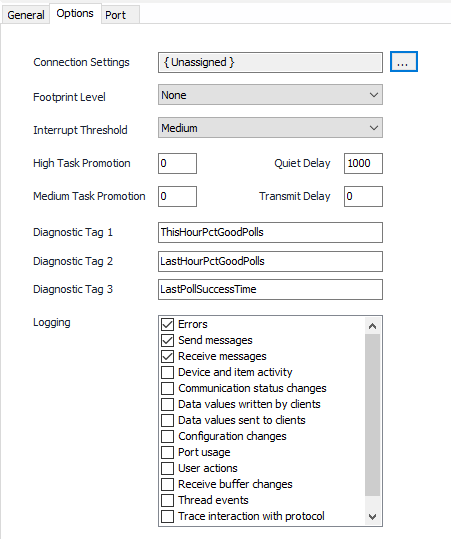Common Port Configuration
Overview
The following attributes are common to all types of ports used in ACM.
See the General Object Configuration guide for assistance configuring the General tab.
Options Tab
Connections Setting
This property assigns a Connection Settings object to the port object.
Footprint Level
Options:
- None. (Default)
- Entry and Exit: This logs the server basic function entry and exit. This allows ACM to trace back to a certain location inside the code to see where the problem might be.
- Entry, Exit, and Parameters: This logs the server basic function entry and exit, as well as the parameters values passed in and passed out of these functions.
Interrupt Threshold
The priority level that will interrupt the poll in progress. Tasks with a higher priority than that selected will interrupt the poll in progress for this port.
Options:
- Low (Default): Queue up with other Low priority items.
- Medium: Interrupts Low priority items, and queues up with other Medium priority items.
- High: Interrupts Medium and Low priority items, and queues up with other High priority items.
Related
Also See Priority Levels.
High Task Promotion
This is designed to prevent high priority tasks from indefinitely blocking lower priority tasks. Use this field to specify a maximum number of high priority tasks that will run before allowing a lower priority task to have a turn. For example, if this is set 5 and there are 7 high priority tasks and 1 medium task in the queue, 5 of the 7 high priority tasks would run, and then the medium priority task would get its turn. Then the remaining 2 high priority tasks would run. A value of zero in this field disables task promotion resulting in all tasks running strictly in their priority order.
Medium Task Promotion
This is designed to prevent medium priority tasks from indefinitely blocking lower priority tasks. Use this field to specify a maximum number of medium priority tasks that will run before allowing a lower priority task to have a turn. For example, if this is set to 5 and there are 7 medium priority tasks and 1 low task in the queue, 5 of the 7 medium priority tasks would run, and then the low priority task would get its turn. Then the remaining 2 medium priority tasks would run. A value of zero in this field disables task promotion resulting in all tasks running strictly in their priority order.
Quiet Delay
The time between closing the connections and re-opening (in milliseconds).
Transmit Delay
The delay period before transmitting each message (in milliseconds).
Tip
Some devices need a little bit of a buffer so they can “wake-up” and properly receive the request for data. For a weak 3G connection, 2000 or 4000 MS is suggested.
However, also be aware that this delay precedes every message ACM sends on the port, so overall communication speed will decrease.
Logging
Logging options:
- Errors. (Default = Selected) Any errors occurring with communications or with unexpected results.
- Send messages. (Default = Selected) Every message sent to a device to request data will be logged.
- Receive messages. (Default = Selected) Every message sent to a port to provide data will be logged.
- Device and item activity. When items or devices are removed, added, activated or deactivated, an appropriate log is generated.
- Communication status changes. A message will be logged whenever communication status changes from bad to good or vice-versa.
- Data values written by clients. When data is written to an item, it will be logged in logical units.
- Data values sent to clients. When data is received from the device, it will be logged in logical units.
- Configuration changes. A message will be logged when any change to the current configuration is made.
- Port usage. A message will be logged when a socket or serial port opens and closes.
- User actions. Logs protocol transactions and requests generated by user commands.
- Receive buffer changes. Logs each change to a port's data buffer due to data received from the port.
- Thread events. Logs polling thread state events such as open, transmit, user done, quiet and close.
- Trace interaction with protocol. Logs notifications between protocol and communication modules.
- Suppress write entries. Removes write transaction related messages from being logged.
Related content
For assistance, please submit a ticket via our Support Portal, email autosol.support@autosoln.com or call 281.286.6017 to speak to a support team member.
